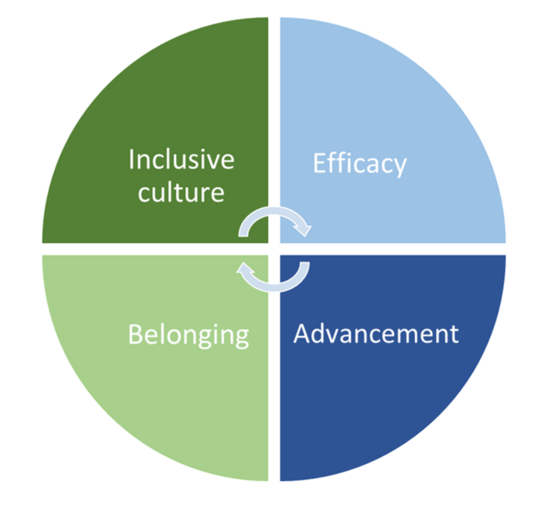Program Goals
The goal of the ARA (Advancement and Retention in Academe) Faculty Mentoring Program is to enhance the ability of our early-career faculty to navigate the challenges of academe during these unprecedented times and in the future. ARA fosters an active and collaborative process for the development of an “intelligent career,” rather than a “reactive career” that responds to impending crises. As the demands of academia have changed and continue to change in public research universities, the ARA program will focus on identifying key career competencies (knowing what, why, when, how, and whom) that are foundational for success in academe and specifically at UCR. For this reason, the mentoring program’s curriculum is designed to: (1) enhance mentor/mentee competencies, (2) support and facilitate junior faculty career development through mentoring, and (3) improve campus climate by increasing awareness of systemic inequities and promoting a culture of mentorship.

Belonging and promoting an Inclusive Culture at UC Riverside
The ARA program is designed to complement current departmental efforts in mentoring and has four components.
-
Workshops for Mentors: Three workshops train senior faculty in the best practices for being an effective mentor for assistant professors. These workshops are designed to enhance the mentoring capacity within the college and engage both Associate and Full Professors. Participation in the Train the Mentors workshops is required to become an official ARA mentor.
-
Professional development workshops: These workshops are designed for our assistant professors. We will address topics to enable easy navigation of the path to tenure. The workshops are accessible to all CNAS faculty.
-
ARA mentees: The CNAS assistant professors apply to become an ARA mentor at the time of the annual ARA Mentee/Mentor call. CNAS assistant professors who are at least two years from submitting a tenure file are eligible to become an ARA mentee. ARA mentees are paired with a trained UCR ARA mentor and a mentor from another UC, who is closely aligned to the assistant professor’s field of study. Finally, each ARA mentee is provided a $2400 stipend to promote the mentorship relationship with their external mentor, which can include travel of the external mentor to UC, travel of the ARA mentee to the external mentor’s home campus, or other ARA program-approved activities that promote the mentee’s professional development.
-
UCR ARA Mentors: The CNAS associate and full professors apply to become an ARA mentor at the time of the annual ARA Mentee/Mentor call. UCR ARA mentors are from a different home department than the ARA Mentee and are paired based on the ARA Mentee’s mentoring needs. The UCR ARA mentor will have participated in the three Train the Mentors workshops. Each ARA mentor receives a $1000 stipend at the end of their first year of program participation.
-
ARA External Mentors: The ARA External Mentor is an associate or full professor from one of the UC’s sister campuses. This mentor is closely aligned with the ARA Mentee’s field of study. To date, ARA External Mentors are from the UCB, UCD, UCI, UCLA, UCSB, and UCSC campuses. External mentors receive a $1000 stipend at the end of their first year of the mentoring partnership.
The ARA program is designed to foster a sense of community and a culture of mentorship that is recognized by our merit and promotion system for its value and long-term impact on the success of both our Mentees and Mentors. These initiatives are enhancing collegiality, work-life balance, faculty success in research, teaching, and service, and providing avenues for professional and leadership growth within our departments, college, and campus. The enrichment of our CNAS community is enhancing the self-efficacy and satisfaction of early-career faculty, which should result in professional success and retention at UCR.
Funding
The ARA Faculty Mentoring Program was initiated within funding from the University Office of the President Advancing Faculty Diversity (UCOP AFD) Program Retention Grant. This three-year grant has supported 24 ARA Mentees and 25 Mentors and all workshops and meetings from AY2022-23 to December 2025. Grant PIs were: Patricia Springer (BPSC), Linda Walling (BPSC), Loralee Larios (BPSC), Peter Homyak (ENSC), and Sam Ying (ENSC).
Three additional ARA Mentees and their ARA Mentors are supported by the UCOP AFD Recruitment Grant to Natalie Holt, Kieran Samuk, and Lucy Delaney from the Department of Evolution, Ecology, and Organismal Biology.
The College of Natural and Agricultural Sciences (CNAS) is continuing to fund the ARA Faculty Mentoring Program for three additional years (2025-2028), giving all interested CNAS assistant professors the option to become an ARA Mentee.
Grant PIs
The ARA Advisory Board
The ARA Advisory Board: provides guidance on the implementation and assessment of the ARA Faculty Mentoring Program. The Advisory Board membership is designed to provide faculty perspectives from the assistant, associate and full professor ranks. Every effort will be made to assure that life, physical and mathematical science faculty are represented on the Advisory Board.
The Advisory Board:
- provides advice on the focal topics for the professional development and Train the Mentors workshops.
- evaluates the program’s progress and evaluates the quality of workshops, and makes recommendations for improvements based on the ARA Annual Report.
- prioritizes nominations for the ARA Distinguished Speaker.
- provides feedback on the ARA website and materials within.
- provides recommendations for actions to assure the sustainability of the ARA program.
- will participate in discussions of the mentoring needs of associate professors and mechanisms to enhance the associate professor experience (AY2025-26, a new initiative).
The Advisory Board membership is designed to provide faculty perspectives from the assistant, associate and full professor ranks and includes the CNAS Equity Advisors. Every effort will be made to assure that life, physical and mathematical science faculty are represented on the Advisory Board. Their terms of service are designed to promote leadership from senior faculty and perspectives from junior faculty.












